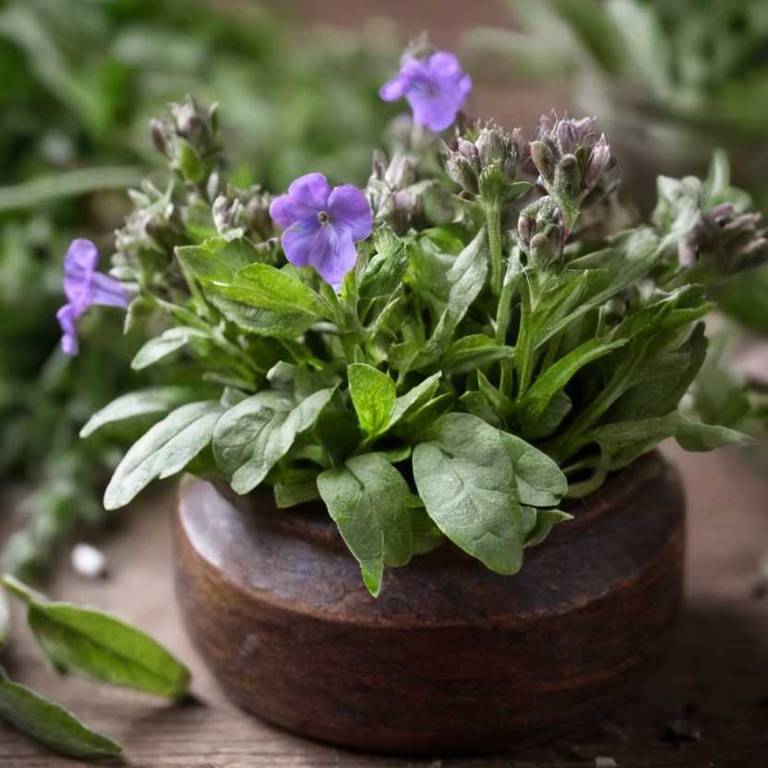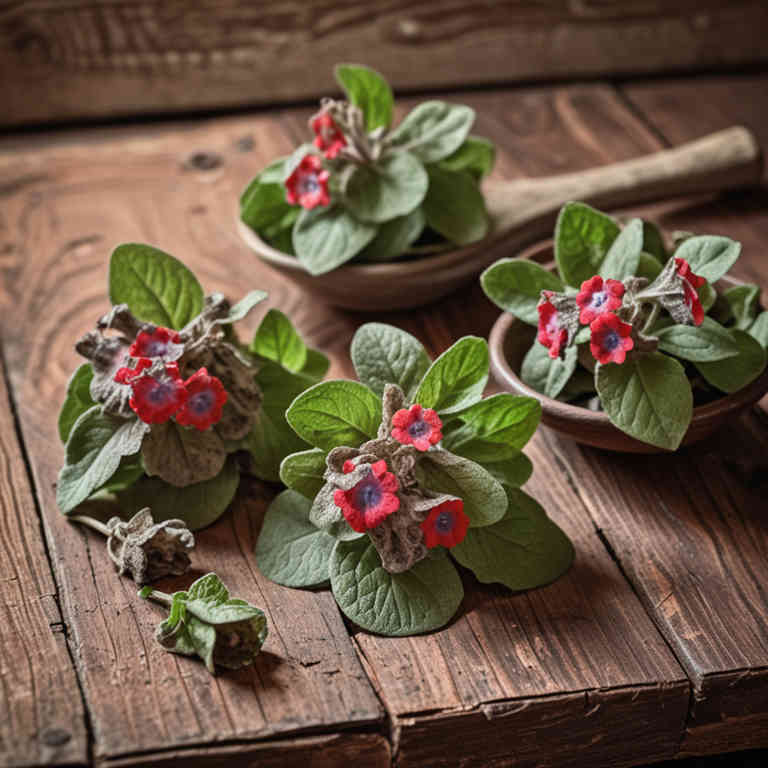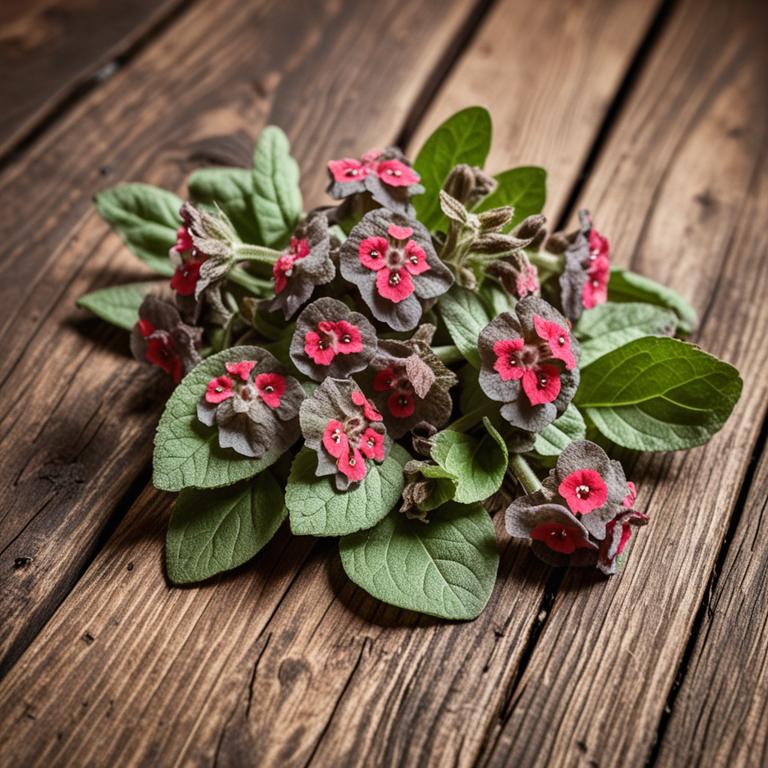10 Best Pulmonaria Officinalis Preparations

The best medicinal preparations of Pulmonaria officinalis are teas, decoctions, mucillages, tinctures, and poultices, each offering unique therapeutic benefits.
Teas made from the dried leaves are commonly used to soothe respiratory conditions and reduce inflammation.
Decoctions, prepared by boiling the root, are valued for their expectorant properties.
Mucillages, derived from the plant's tissues, act as demulcents to coat and protect irritated mucous membranes.
Tinctures provide a concentrated form of the herb’s active compounds for internal or external use, while poultices apply the plant’s healing properties directly to the skin for topical relief.
Below there's a list of the 10 best herbal preparations of pulmonaria officinalis for medicinal purposes.
- 1. Teas
- 2. Decoctions
- 3. Mucillages
- 4. Tinctures
- 5. Poultices
- 6. Syrups
- 7. Linctuses
- 8. Lozenges
- 9. Oils
- 10. Creams
1. Teas
Pulmonaria officinalis teas is commonly used to treat respiratory conditions such as coughs, bronchitis, and asthma due to its soothing and anti-inflammatory properties.
The most common medicinal uses of this herbal preparation include alleviating symptoms of respiratory infections, easing breathing difficulties, and reducing inflammation in the airways. The bioactive constituents responsible for these effects include flavonoids, saponins, and mucilage, which have antimicrobial, expectorant, and anti-inflammatory actions. These compounds help to loosen mucus, reduce irritation, and support the healing of lung tissues.
Overall, Pulmonaria officinalis tea is valued as a natural remedy for supporting respiratory health.

2. Decoctions
Pulmonaria officinalis decoctions is commonly used to treat respiratory conditions such as coughs, bronchitis, and asthma due to its soothing and expectorant properties.
These decoctions are also used to alleviate symptoms of colds, sore throats, and inflammatory lung diseases. The bioactive constituents responsible for these effects include alkaloids, flavonoids, saponins, and mucilage, which have anti-inflammatory, antimicrobial, and expectorant actions. Additionally, the plant's high mucilage content helps to lubricate the respiratory tract and ease breathing.
This herbal preparation is valued for its ability to support respiratory health and ease discomfort associated with various pulmonary ailments.

3. Mucillages
Pulmonaria officinalis mucillages is commonly used to soothe respiratory tract irritation and support lung health.
The mucillages are often employed in the treatment of coughs, bronchitis, and other respiratory ailments due to their demulcent properties. These preparations are also used to alleviate sore throats and reduce inflammation in the upper respiratory system. The bioactive constituents include mucilage polysaccharides, tannins, and flavonoids, which contribute to their anti-inflammatory and soothing effects.
Additionally, the presence of certain alkaloids and essential oils may enhance its therapeutic benefits.

4. Tinctures
Pulmonaria officinalis tinctures is commonly used to treat respiratory conditions such as coughs, bronchitis, and asthma due to their expectorant and anti-inflammatory properties.
These tinctures are also used to alleviate symptoms of colds, sore throats, and other upper respiratory tract infections. The bioactive constituents responsible for these medicinal effects include saponins, flavonoids, and mucilage, which help to soothe irritated tissues and promote the expulsion of mucus. Additionally, the plant contains volatile oils and tannins that contribute to its antimicrobial and astringent properties.
Overall, Pulmonaria officinalis tinctures are valued for their ability to support respiratory health and ease breathing in individuals suffering from chronic or acute respiratory ailments.

5. Poultices
Pulmonaria officinalis poultices is commonly used to treat respiratory conditions such as coughs, bronchitis, and asthma due to their anti-inflammatory and expectorant properties.
These poultices are also applied externally to soothe skin irritations, wounds, and inflammatory conditions like eczema or arthritis. The most common medicinal uses include alleviating symptoms of respiratory infections and promoting healing of skin ailments. The bioactive constituents responsible for these effects include flavonoids, saponins, tannins, and mucilage, which have antimicrobial, anti-inflammatory, and soothing properties.
These compounds work together to reduce inflammation, fight infections, and support tissue repair.

6. Syrups
Pulmonaria officinalis syrups is commonly used to treat respiratory conditions such as coughs, bronchitis, and asthma.
These syrups are valued for their soothing and expectorant properties, which help to ease breathing and clear mucus from the airways. The most common medicinal uses include alleviating symptoms of colds, sore throats, and other upper respiratory tract infections. Bioactive constituents such as flavonoids, mucilage, and tannins contribute to its anti-inflammatory, antispasmodic, and demulcent effects.
These compounds work together to reduce irritation and promote healing in the respiratory system.

7. Linctuses
Pulmonaria officinalis linctuses is commonly used to relieve respiratory symptoms such as coughing, bronchitis, and asthma.
This herbal preparation is traditionally employed to treat ailments related to the respiratory system, including persistent coughs, inflammation of the airways, and mild cases of bronchial congestion. The bioactive constituents responsible for its medicinal properties include mucilage, flavonoids, tannins, and essential oils, which contribute to its soothing and anti-inflammatory effects. These components help to reduce irritation in the throat and airways, making it effective for easing coughing and promoting easier breathing.
Additionally, the presence of antioxidants may support the body’s natural defenses against respiratory infections.

8. Lozenges
Pulmonaria officinalis lozenges is commonly used to alleviate symptoms of respiratory tract infections, such as coughs, sore throats, and bronchitis.
These lozenges are traditionally employed to soothe irritation in the throat and reduce inflammation in the airways. They are also used to support the healing of mucous membranes in the respiratory system. The most common medicinal uses include treating colds, flu, and other conditions that cause coughing and throat discomfort.
The bioactive constituents responsible for these effects include flavonoids, tannins, and mucilage, which possess anti-inflammatory, antimicrobial, and soothing properties.

9. Oils
Pulmonaria officinalis oils is commonly used to treat respiratory conditions such as coughs, bronchitis, and asthma due to its expectorant and anti-inflammatory properties.
The oil is also applied topically to alleviate skin irritations and respiratory infections. It is often used in aromatherapy to ease breathing and reduce congestion. The most common medicinal uses include treating coughs, bronchial issues, and skin ailments.
The bioactive constituents responsible for these effects include essential oils like camphor, thujone, and menthone, which possess antimicrobial, anti-inflammatory, and bronchodilatory properties.

10. Creams
Pulmonaria officinalis creams is commonly used to treat respiratory and skin conditions.
These creams are often applied for their soothing and anti-inflammatory properties. The most common medicinal uses include alleviating symptoms of coughs, bronchitis, and skin irritations. They are also used to reduce inflammation and promote healing in minor wounds.
The bioactive constituents responsible for these effects include flavonoids, tannins, and mucilage, which have antioxidant, anti-inflammatory, and soothing properties.
